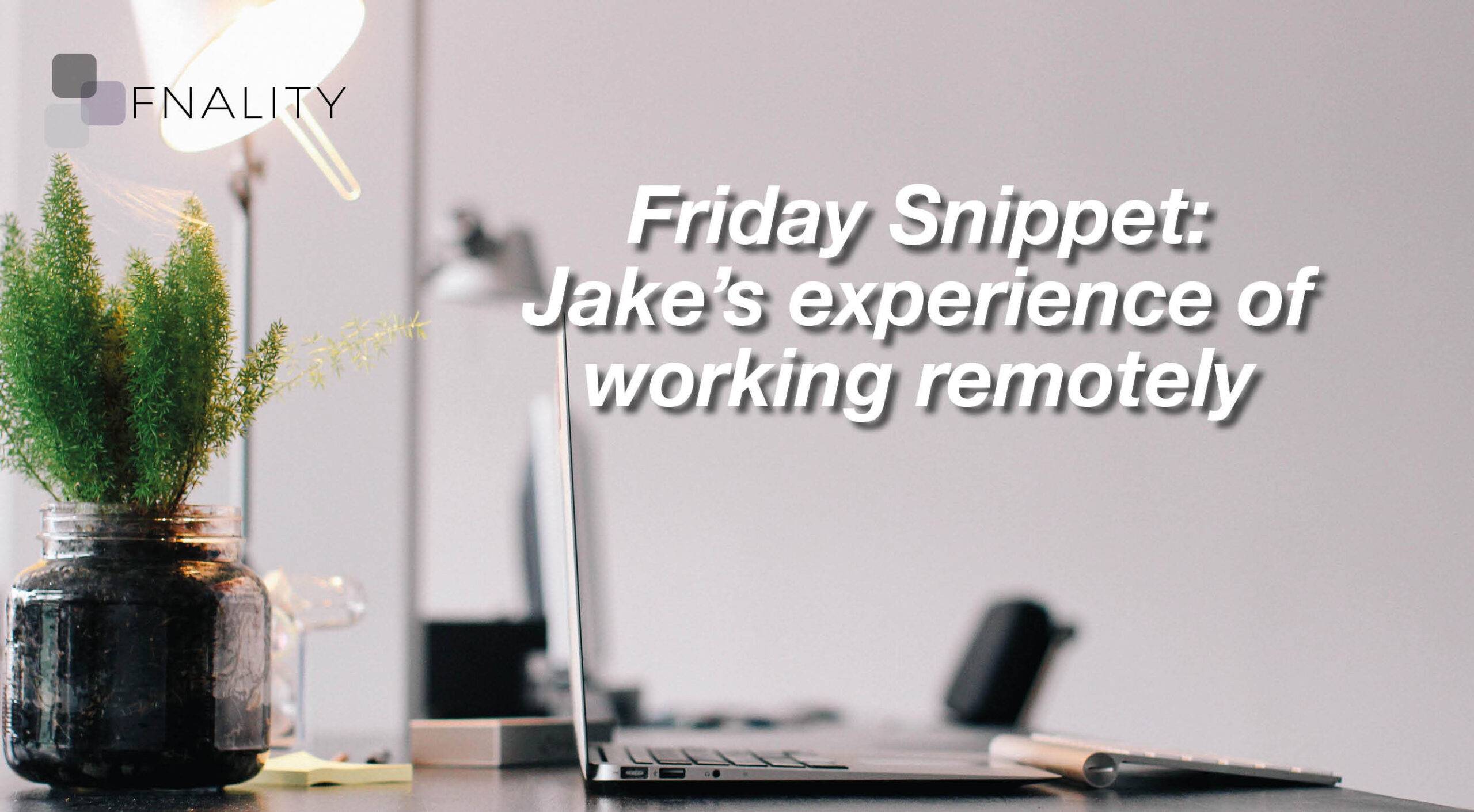Friday Snippet: Jake’s experience of working remotely


The sudden and ubiquitous shift to remote working has been called ‘the largest behaviour-change experiment in the history of humanity’, and it has been interesting to observe the ways in which friends and colleagues at Fnality have managed the challenges of these changes while discovering and embracing the opportunities that they present.
The move away from the office has exposed the potential unsuitability of many living spaces to double as a working space, and employers (including here at Fnality) have been generous in providing their employees with productivity allowances so as to minimise the practical impact of this transition. However, this move is not a purely practical issue. The much greater challenge lies in replicating or replacing the incorporeal aspects of the office – work and ‘business’ more broadly are inherently social phenomena, and both the face-to-face collaboration central to the act of work and the casual chit-chat that is ancillary to it were rapidly lost. In such circumstances, it is easy for an organisation to lose sight of its central purpose, and for employees to lose feelings of closeness and attachment to this purpose and to each other. That’s why at Fnality we have redoubled our efforts to collectively focus on our mission, vision, and ways of working, and to utilise the collaboration tools available to us to ensure that we preserve the camaraderie and belonging necessary for both the formal and the informal sides of the workplace. As regards the former, I have found weekly design forums – where the whole organisation is invited to contribute to discussions around key design decisions for our Fnality Payment Systems – particularly engaging and collaborative. For the latter, regularly scheduled conference calls, open to all, for breakfasts, quizzes, evening socials, and more have been an effective counterbalance, keeping the lighter side of work alive, even if they can’t match the real thing.
On the topic of balance, much has been made of the potential for remote working to dissolve boundaries between work and life. To me, this is – as it was pre-Covid – an area of intense personal responsibility. While organisations have a role to play in ensuring that employees have the time and space to complete their work within the confines of the working day, it is also incumbent upon the individual to clearly define what an acceptable work-life balance looks like to them, and to aggressively delineate between their personal and professional spheres. If anything, it seems to me that the most visible consequence of remote working has been to empower individuals to redefine what the ‘working day’ looks like for them. The traditional, societally charged temporal slot wherein work and all activities related to it are completed and then ‘put back in their box’ is being repurposed for all manner of activities that aren’t strictly ‘work’ at all. Colleagues are seizing new learning and development opportunities – in the case of Fnality generously supported by workplace grants to do so. I have seen them place a greater focus on personal wellbeing, be it by leveraging time that would previously have been consumed by a commute to work on their physical fitness, or by attending frequent wellbeing sessions organised by our Mental Health First Aiders Fran and Tam to discuss and improve psychological fitness. It has also been quite inspiring to see the time gained from improvements in work-life balance put to great use in responsible or charitable endeavours like regular food bank collections, working groups on CSR/eco obligations, or just consciously supporting those who can’t work from home by bringing custom to smaller local businesses rather than one of the myriad sandwich chains near the office.
Seeing friends and colleagues lean into these changes with such vigour, I wonder how we will all look back on this time in the general sense, as this will likely have a profound impact on the specific case of remote working too. The fragility of life and the society in which we experience it has certainly been laid bare. Maybe the motif of post-Covid life will be the collective realisation that it is short, meant to be lived intentionally and on our own terms rather than on those imposed upon us by working practices that suddenly seem to be little more than anachronisms. Currently a necessity born from crisis, it seems likely that for many remote working will remain non-negotiable long after the pandemic loosens its grip on the world. When the ‘new normal’ is no longer new, it will be incumbent upon employer and employee to work together to leverage the opportunities that this transformation of our ways of working presents; the prize a profound, lasting ‘better normal’ with implications far beyond the workplace. To be a part of an organisation that has strong, central ambitions of grasping that prize is a great privilege.